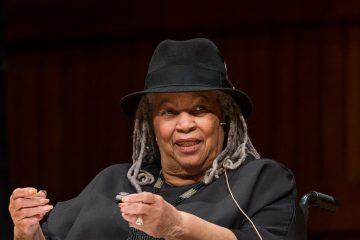From The New York Times:
Toni Morrison spoke at Harvard Divinity School on the subject of altruism in 2012. Her lecture is published here for the first time.
 On an October morning in 2006, a young man backed his truck into the driveway of a one-room schoolhouse. He walked into the school and after ordering the boy students, the teacher and a few other adults to leave, he lined up 10 girls, ages 9 to 13, and shot them. The mindless horror of that attack drew intense and sustained press as well as, later on, books and film. Although there had been two other school shootings only a few days earlier, what made this massacre especially notable was the fact that its landscape was an Amish community — notoriously peaceful and therefore the most unlikely venue for such violence.
On an October morning in 2006, a young man backed his truck into the driveway of a one-room schoolhouse. He walked into the school and after ordering the boy students, the teacher and a few other adults to leave, he lined up 10 girls, ages 9 to 13, and shot them. The mindless horror of that attack drew intense and sustained press as well as, later on, books and film. Although there had been two other school shootings only a few days earlier, what made this massacre especially notable was the fact that its landscape was an Amish community — notoriously peaceful and therefore the most unlikely venue for such violence.
Before the narrative tracking the slaughter had been exhausted in the press, another rail surfaced, one that was regarded as bizarre and somehow as shocking as the killings. The Amish community forgave the killer, refused to seek justice, demand vengeance, or even to judge him. They visited and comforted the killer’s widow and children (who were not Amish), just as they embraced the relatives of the slain. There appeared a number of explanations for their behavior — their historical aversion to killing anyone at all for any reason and their separatist convictions. More to the point, the Amish community had nothing or very little to say to outside inquiry except that it was God’s place to judge, not theirs. And, as one cautioned, “Do not think evil of this man.” They held no press conferences and submitted to no television interviews. They quietly buried the dead, attended the killer’s funeral, then tore down the old schoolhouse and built a new one.
Their silence following the slaughter, along with their deep concern for the killer’s family, seemed to me at the time characteristic of genuine “goodness.” And I became fascinated with the term and its definition.
More here.
